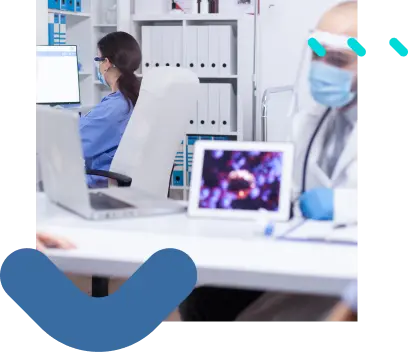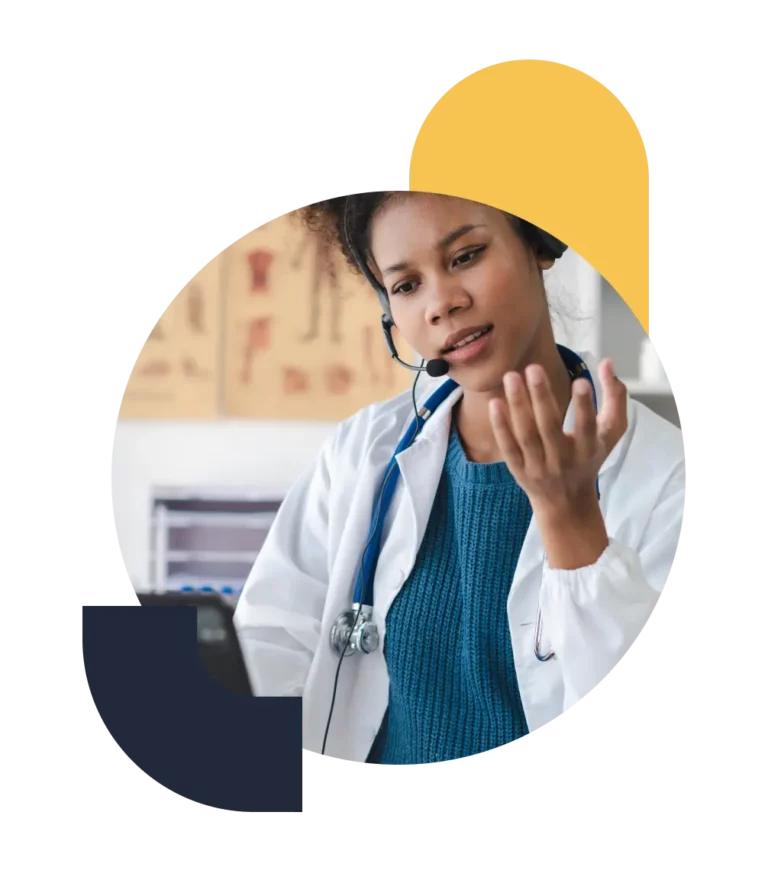Diagnostics-as-a-Service:
Revolution in laboratory diagnostics
Diagnostics-as-a-Service (DaaS) is changing the world of laboratory diagnostics and making specialized health data easily accessible, flexible and digitalized. The Probatix platform connects doctors, digital health companies, pharmacies and other participants in the healthcare sector with laboratories. This makes it easy to use laboratory services without having to build up individual laboratory capacities or connect laboratories.
How exactly does Diagnostics-as-a-Service work? What advantages does it offer? And why is this service so valuable for companies in the healthcare sector in particular?

Strong customers and partners already rely on Probatix
Table of contents
What is Diagnostics-as-a-Service?
Diagnostics-as-a-Service is a service model that aims to provide laboratory diagnostics in an easily accessible, user-friendly and digitized format. At its core, it is a platform solution that enables healthcare providers to use laboratory analyses quickly and easily without having to delve into complex technical details.
For health tech companies or digital health platforms that want to offer specific diagnostic tests to their users, DaaS eliminates the need to build their own laboratory capacity. Instead, they can work with DaaS provider Probatix, which offers them seamless integration of lab results into their digital applications and platforms.
For companies that develop innovative healthcare solutions, customized blood tests and other diagnostics can be made available in a short time and with little effort.
The process of a Diagnostics-as-a-Service model
The DaaS model process can be divided into four main steps:
- Integration into the customer platform: The first step is to integrate the DaaS offering into the existing infrastructure of the customer platform. This can be an app, an online health platform or a nutrition coaching service. In this step, Probatix provides the necessary interfaces (APIs) and tools to seamlessly connect the test processes.
- Ordering and sample collection: Providers or their end customers can order a test via the partner platform, e.g. a small blood count, a fertility test or an allergy check. Samples are often taken at home using specially developed test kits that are easy to use. Alternatively, for some tests, samples can also be taken in pharmacies or doctors’ surgeries.
- Laboratory analysis and data processing: As soon as the samples arrive at the laboratory, they go through the analysis process. The DaaS provider coordinates this step and ensures that the data quality and accuracy meet medical standards. The test results are then digitized and processed in a structured form so that they can be transmitted directly to the partner platform.
- Results and feedback: The results are automatically made available on the partner’s platform, where they are presented in a simple and understandable way. This allows healthcare platforms to offer their users detailed diagnostic data that they can further interpret and translate into personalized programs.


Advantages of Diagnostics-as-a-Service
Diagnostics-as-a-Service is more than just a convenient model for performing tests; it offers specific benefits that benefit both users and healthcare providers:
Seamless integration and flexibility
Thanks to modern interfaces and protocols, the DaaS model can be easily integrated into existing systems. It allows healthcare platforms and health tech companies to easily integrate diagnostic data into their own processes without the need for in-depth technical expertise or significant investment in infrastructure.
Scalability and cost efficiency
Thanks to modern interfaces and protocols, the DaaS model can be easily integrated into existing systems. It allows healthcare platforms and health tech companies to easily integrate diagnostic data into their own processes without the need for in-depth technical expertise or significant investment in infrastructure.
Timely and precise results
Speed and precision are crucial in the field of laboratory diagnostics. By transmitting the data digitally and working with certified laboratories, DaaS can ensure that the results are reliable and available in a fraction of the time that conventional laboratory tests would require.
Personalized healthcare services
For many companies in the healthcare sector, the ability to create personalized health programs is crucial. DaaS makes it possible to seamlessly integrate specific laboratory data and analyze users' individual health parameters. Platforms can thus offer personalized recommendations that specifically address the health needs of each user.
Data security and compliance
Data protection is a key aspect in the processing of sensitive health data. Modern DaaS platforms operate under strict data protection guidelines and use encryption that meets the strict requirements of the GDPR (General Data Protection Regulation). This ensures that users' sensitive data is processed safely and securely.
Application examples: Diagnostics-as-a-Service in practice
Diagnostics-as-a-Service is already widely used in various areas of healthcare. Here are some examples of how DaaS is transforming the industry:
1. telemedicine
Telemedicine platforms benefit greatly from DaaS, as they can now also give their users the option of booking laboratory tests and evaluating the results directly in digital form. This allows patients to discuss their results with their doctor and receive direct recommendations for action without having to visit a physical laboratory.
2. longevity
The availability of test data such as vitamin and mineral levels allows Longevity coaches to create personalized plans and make specific nutritional supplement recommendations. The quick and direct availability of this data enables coaches to make their services even more precise.
3. digital health and wellness platforms
Platforms that focus on the well-being of their users use DaaS to monitor health parameters such as hormone levels, stress levels and vital substance supply. This data is fed into holistic programs that are specifically designed to improve quality of life.
4. precaution and prevention
Companies in the field of prevention can use DaaS to gain access to extensive data that enables users to react to health risks in good time. Tests such as blood count analyses and cardiovascular screenings provide valuable data for the early detection of diseases.
Challenges and future prospects
Although DaaS offers numerous advantages, there are also challenges that need to be addressed. These primarily include the issues of data protection and interoperability. It is crucial that healthcare data is processed securely and completely protected against unauthorized access. Smooth collaboration between different healthcare platforms and laboratories also needs to be further improved to ensure seamless integration.
The future of Diagnostics-as-a-Service looks promising. As digitalization progresses and the demand for personalized healthcare services increases, DaaS will play an even more important role in the healthcare sector. The model could also find its way into precision medicine in the future and help to identify disease risks even more precisely through the use of AI-supported analyses.
Conclusion: Diagnostics-as-a-Service as the key to modern laboratory diagnostics
Diagnostics-as-a-Service is a modern and flexible model that is revolutionizing diagnostics and taking it to a new level. It enables digital healthcare providers to support their customers quickly, efficiently and comprehensively and provides an important foundation for the future of personalized healthcare. By simplifying testing processes and incorporating modern technology, DaaS makes laboratory diagnostics more accessible and personalized. This makes healthcare smarter and more digitally connected – to the benefit of everyone involved.
